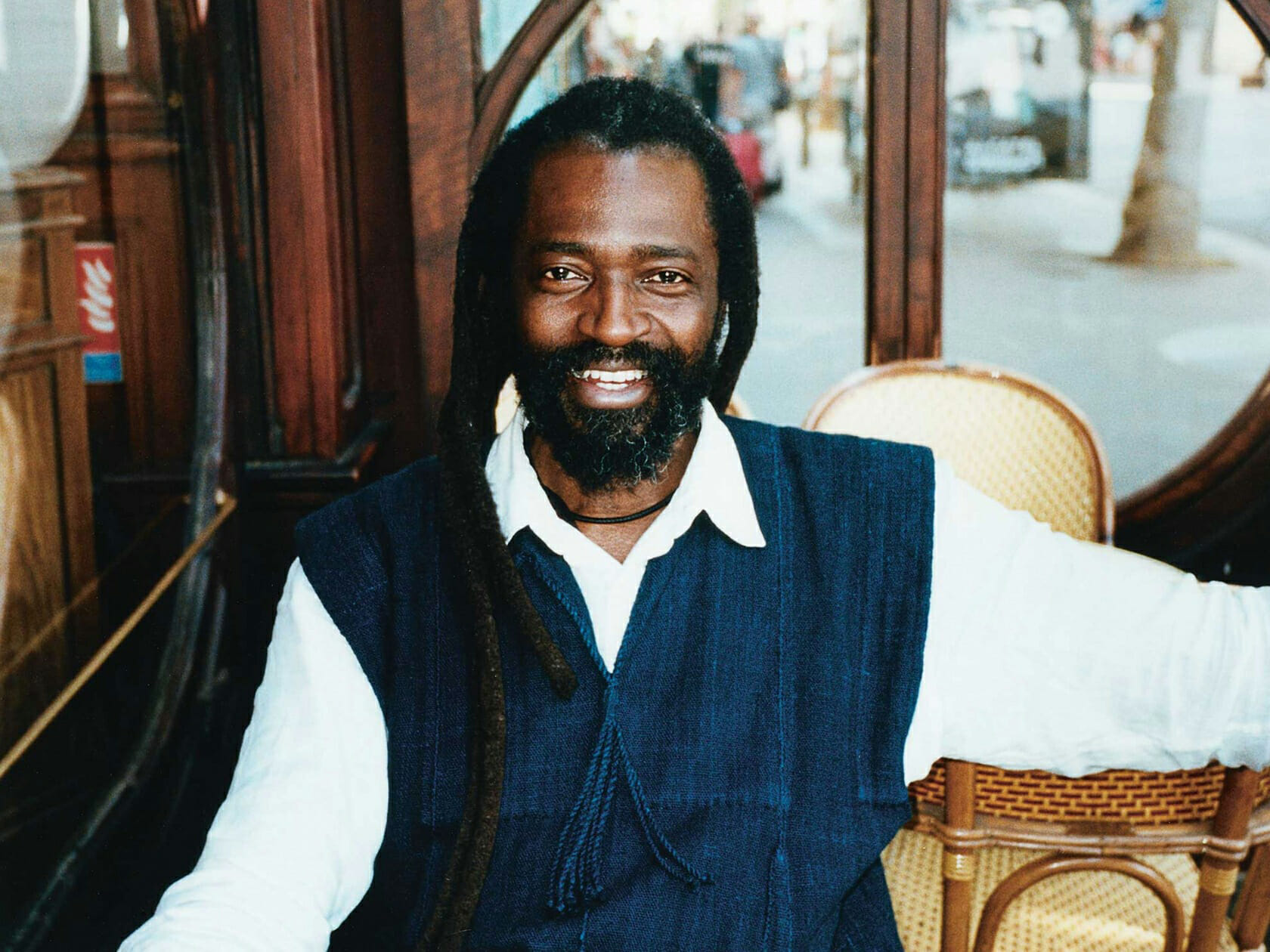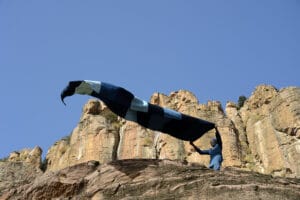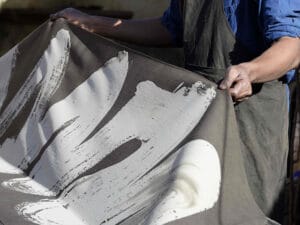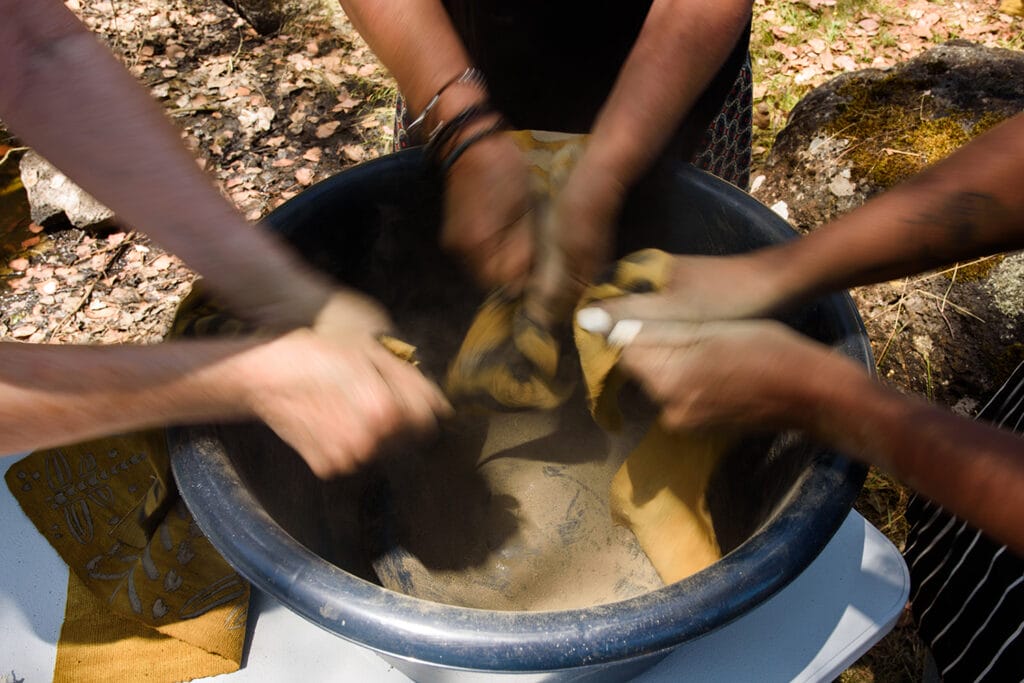Past Program

Overview
Born in Mali and raised between Mali and France, Aboubakar is world renowned for his work in reinvigorating and redefining West African indigo dyeing techniques, and much of his focus is devoted to the preservation and reinterpretation of traditional West African textile and natural dyeing techniques and materials.
A true master of natural dyes, he specialises in the Grands Teints, the lightfast, washfast, colourfast and permanent natural dyes that formed the repertoire of natural dyers throughout the ages prior to the introduction of synthetic dyestuffs. His atelier is in Bamako, Mali, and he also has a farm in the southwest of Mali where he grows the two indigenous West African species of indigo-bearing plants he uses in his own work, as well as an extensive array of other dye plants and trees, fruit, vegetables and medicinal plants.
Aboubakar is one an InPlace International Residency Commission, and is one of a number of lead artists on the interdisciplinary project, Escarpment. In 2023, Aboubakar undertook the first research phase of this ongoing residency partnership with InPlace at the Garambi Baanj/Laughing Waters Cultural Precinct, working alongside Escarpment lead artist, Siri Hayes, and InPlace Director Eugene Howard. During Aboubakar’s 2024 residency, he will work alongside Siri Hayes and InPlace to collaboratively progress the centrepiece of the project: growing over 1500 native Australian indigo (Indigofera Australis)-scattered across the Garambi Baanj Precinct and Coranderrk-and laying the foundations for a large-scale dye vat in 2025-26. As part of this project Hayes, Fofana and InPlace will be travelling to Galiwin’ku in the Northern Territory to undertake a cultural exchange with Yolnu weavers and dyers.

Installation de textiles par le designer plasticien Aboubakar Fofana dans le district de Siby le 22 December 2019, Mali

Installation by Aboubakar Fofana. Tente moustiquaire, Fleuve Niger, Mali. Photo: Courtesy of Aboubakar Fofana.

Calligraphy using mud die technique on textile, Aboubakar Fofana, Bamako Mali
For Aboubakar’s 2024 residency, InPlace has partnered with The Social Studio to deliver an exclusive workshop series: one for African-continent diaspora communities working with The Social studio, and another for South East Australian First Nations artists. This workshop series is supported by Creative Australia and Office for the Arts’ Indigenous Visual Arts Industry Support program, ensuring the entire workshop series is fully subsidised.
As a working textile artist and designer Aboubakar is known for his work in fermented vegetal indigo and mineral mud-dyed textiles, and for his comprehensive workshops and lectures given on various dyestuffs and techniques globally. A growing focus in Aboubakar’s teaching across the globe is around supporting cultural reclamation. Aboubakar shares cultural knowledge with African-continent diaspora communities as well as First Nations communities for whom these practices may have particular cultural resonance. He works with communities who are nurturing cultural practices previously damaged through colonisation, slavery, and forms of displacement, and who continue to live with these impacts.
Aboubakar’s workshops are comprehensive, in-depth experiences which are deeply cultural as well as practical. Using proper quantities of dyestuff Aboubakar teaches the techniques necessary to get permanent, lightfast, evenly dyed results. Aboubakar has collaborated for many years with interior designers, acclaimed fashion designers, tapestry weavers, and others as well as producing his eponymous line of naturally dyed homewares and accessories, many of which feature handspun and handwoven Malian cotton, a textile he continues to champion.
These workshops are open to artists, cultural workers, textile, and fashion practitioners, as well as researchers, who have a professional career in these industries. This may be evidenced by providing your curriculum vitae or outlining via email your area of research or providing endorsement from leaders in your communities.
InPlace and Aboubakar Fofana have made one place available in each workshop as a subsidised place, these are open to those experiencing financial hardship and/or from culturally and racially marginalised communities.
Three day intensive indigo workshop for professional artist, textile and fashion practitioners
Cost: $1,100 +GST
Dates: 12 April – 14 April
Times each day: 9.30am – 4.30pm
Three day intensive mineral mud dye workshop for professional artist, textile and fashion practitioners
Cost: $1,100 +GST
Dates: 18 April – 20 April
Times each day: 9.30am – 4.30pm
To apply and book a place please contact: Admin@inplace.org.au if you are accepted into the program further details will be mailed to you directly, accompanied by an invoice.
These workshops are capped at 10 participants. The workshop will be confirmed as proceeding once eight participants are locked in.
If you are applying for the subsidised placement, we aim to keep this process as simple as possible, please simply attach approximately a 200 word rationale, and a letter/email of support from a leader in your field, or relevant community leader. This will be reviewed by Dewi Cooke (CEO Social Studio), and Aboubakar Fofana, to determine which applicant is most suited to receive this place. Whether these placements are made public is at the discretion of the successful applicants.

Calligraphy using mud die technique on textile, Aboubakar Fofana, Bamako Mali

Aboubakar Fofana ‘Ka touba Farafina ye’ (‘Africa blessing’) 2017. 54 lambs, the African continent, indigo, pasture, and people. Agricultural University of Athens, Athens. Documenta 14 (photo: Stathis Mamalakis, courtesy Documenta 14)
These workshops will be hosted by arts and cultural Not-for-Profit, InPlace. InPlace designed and now operates the new Garambi Baanj/Laughing Waters Cultural Precinct, where these workshops will take place. The workshops will be held at Birrarung House, a historic mud brick house built in 1968, and the former home of acclaimed landscape architect, Gordon Ford.
Situated in secluded bushland in Eltham, Victoria, approximately 25km from Birraranga/Naarm (Melbourne’s) CBD in the North Eastern suburbs, Garambi Baanj (Laughing Waters) sits within the Shire of Nillumbik (Shallow Earth). The Shire is bordered by Murrindindi Shire in the north, Yarra Ranges Shire in the east, Manningham and Banyule Cities in the south, and the City of Whittlesea in the west. The site where the workshops will be taking place is approximately 6km from the main Eltham township and 14km from Warrandyte township.
The workshops will have access to the beautiful surroundings, including the river. The surrounding environment forms part of the Yarra Valley Parklands and is a protected conservation zone.
There is some very limited accommodation available on site, so please contact Admin@inplace.org.au if you have exhausted all your accommodation options.
A note from the organiser: Aboubakar’s workshops use proper quantities of dyestuff and the correct equipment for a professional natural dye practice. In order to both work in the most sustainable and the most comfortable manner, they need to be held somewhere with a lot of open space, where used water can be recycled. Aboubakar has opted to run them in a space which best aligns with the needs of the workshop and with a host whose vision and values is aligned with his own. These workshops represent an ongoing working relationship with InPlace, allowing Abouabakar to visit Australia regularly in the coming years.
Born in Mali in 1967, Aboubakar Fofana left the African continent at an early age for Paris. Fofana’s founding discipline was calligraphy. Fascinated by the sign and the trace, he drew on Western and Eastern traditions to help him master his medium. He wondered if Africa had something similar, and then a series of chance happenings revealed a trove of scripts from across the continent. His first major installation was based around these many written forms, ancient and modern, countering the romantic belief that all African societies belong to oral traditions, and reflecting Fofana’s own spiritual revolution toward Africa as a source of inspiration. And then he remembered a plant he had seen in a forest as a young boy, before his dislocation; a plant that had ordinary-looking green leaves that, when crushed, stained the fingers blue.
Returning to West Africa, he traveled extensively throughout the region, looking for anybody who could teach him to put together a working fermented indigo vat. But the skills had disappeared before he was born, replaced by chemical dyestuffs, leaving only fragments of knowledge. He found much of the information he had been seeking in a library in Paris, pinned into the dry leaves of pre-independence accounts of daily life in West Africa. For many years he went back and forth between his two worlds, taking the pieces of knowledge he found in both places and trying to put them into practice.
Fofana’s tangible output is the result of a spiritual practice based on his fundamental belief that nature is divine, and this is how he shares his practice with an audience. His skill comes from decades of learning to work in harmony with the forces of nature, and his materials, their limitations and innate qualities, utterly inform every aspect of his work. His indigo vats are alive. They contain few ingredients and no chemicals – the color comes from the indigo leaves themselves, pounded and dried. Bacteria, carefully nurtured inside the vat, make the indigotin pigment in the leaves accessible and help to reduce it to a form whereby it will oxidize directly onto the fabric.
Fofana’s work embodies a conscious attempt to hold and defend his techniques and materials, and the environment and human philosophies that gave rise to them. For Fofana, the natural world along with our own human ability is where we began, and it is how we will finish.

Aboubakar Fofana. Photo: Jonas Unger